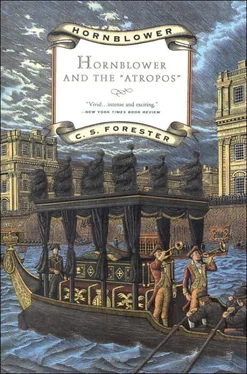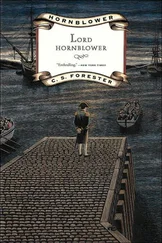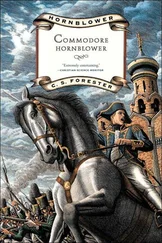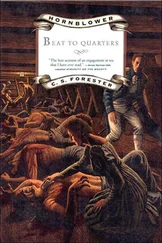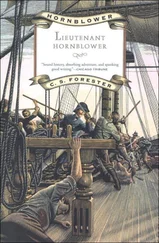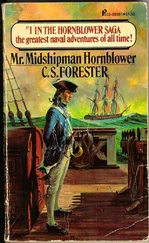He looked forward at the approaching bend with some apprehension, and as they neared it he darted his eyes from bank to bank to make sure he was holding in midchannel. And round the bend, almost upon them, was a bridge—another of these infernal canal bridges, built for economy, with the towpath bulging out under the arch, so that it was hard to sight for the centre of the greatly narrowed channel. Maria was certainly saying something to him, and little Horatio was undoubtedly yelling like a fury, but this was no moment to spare them either a glance or a thought. He steadied the boat round the bend. The hoofs of the lead horse were already ringing on the cobbles under the bridge. God! He was over too far. He tugged the tiller across. Too far the other way! He pushed the tiller back, straightening the boat on her course even as her bows entered the narrows. She turned, very nearly fast enough—her starboard quarter, just where he stood, hit with a solid thump against the elbow of the brickfaced canal side, but she had a thick rope rubbing strake there—presumably to meet situations of this sort—which cushioned the shock; it was not violent enough to throw the passengers off their benches in the cabin, although it nearly threw Hornblower, crouching low under the arch, on to his face. No time to think, not even though little Horatio had apparently been bumped by the shock and was now screaming even more wildly in the bows; the canal was curving back again and he had to guide the Queen Charlotte round the bend.
Crackcrackcrackcrack—that was Jenkins with his whip—was not the speed already great enough for him? Round the bend, coming towards them, there was another canal boat, creeping peacefully along towed by a single horse. Hornblower realized that Jenkins’ four whip cracks were a signal, demanding a clear passage. He hoped most sincerely and fervently that one would be granted, as the canal boat hastened down upon the barge.
The bargee at the tow horse’s head brought the beast to a standstill, edging him over into the hedge beside the towpath; the bargee’s wife put her tiller over and the barge swerved majestically, with her residual way, towards the reeds that lined the opposite bank; so between horse and barge the towrope sank to the ground on the towpath, and into the water in a deep bight. Over the towrope cantered Jenkins’ horses, and Hornblower headed the passage boat for the narrow space between the barge and the towpath. He could guess that the water beside the path was shallow; it was necessary to steer the passage boat to shave the barge as closely as possible, and in any case the bargee’s wife, accustomed to encountering skilled steersmen, had only left him the minimum of room. Hornblower was in a fair way towards panic as the passage boat dashed forward.
Starboard—meet her. Port—meet her. He was giving these orders to himself, as he might to his coxswain; like a streak of lightning through the dark confusion of his mind flashed the thought that although he might give the orders he could not trust his clumsy limbs to execute them with the precision of a skilled helmsman. Into the gap now; the stern was still swinging and at the last moment he got the tiller over to check her. The barge seemed to flash by; out of the tail of his eye he was dimly aware of the bargee’s wife’s greeting, changing to surprise as she noted that the Queen Charlotte was being steered by a man quite unknown to her. Faintly to his ear came the sound of what she said, but he could distinguish no word—he had no attention to spare for compliments.
They were through, in that flash, and he could breathe again, he could smile, he could grin; all was well in a marvellous world, steering a passage boat at nine miles an hour along the Thames and Severn Canal. But that was another yell from Jenkins: he was checking his horses, and there was the grey tower of a lockhouse ahead. The gates were open, the lockkeeper standing by them. Hornblower steered for them, greatly helped by the Queen Charlotte ’s abrupt reduction in speed as her bow wave passed ahead of her. Hornblower grabbed for the stern rope, leaped for the bank, and miraculously kept his footing. The bollard was ten feet ahead; he ran forward and dropped a loop over it and took the strain. The ideal method was to take nearly all the way off the boat, let her creep into the lock, and stop her fully at the next bollard, but it was too much to hope that he could at his first attempt execute all this exactly. He let the line slip through his hands, watching the boat’s progress, and then took too sudden a pull at it. Line and bollard creaked; the Queen Charlotte swung her bows across the lock to bump them against the farther sides and she lay there half in and half out, helpless, so that the lockkeeper’s wife had to run along from the farther gates, lean over, shove the bows clear while seizing the bowline, and, with the line over her sturdy shoulder, haul the boat the final dozen yards into the lock—a clear waste of a couple of minutes. Nor was this all, for as they had now passed the summit level, this was a downward lock, and Hornblower had not readied his mind for this transition. He was taken by surprise when the Queen Charlotte subsided abruptly, with the opening of the gate paddles, along with the emptying water, and he had only just time to slack away the sternline, or else the boat might have been left hanging on it.
“Ee, man, you know little about boats,” said the lockkeeper’s wife, and Hornblower’s ears burned with embarrassment. He thought of the examination he had passed in navigation and seamanship; he thought of how often he had tacked a monstrous ship of the line in heavy weather. That experience was not of much use to him here in inland Gloucestershire—or perhaps it was Oxfordshire by now and in any case the lock was empty, the gates opening, the towlines tightening, and he had to leap down six feet or more in a hurry into the already moving stern, remembering to take the sternline down with him. He managed it, clumsily as ever, and he heard the lockkeeper’s wife’s hearty laugh as he glided on below her; and she said something more, too, but he could pay no attention to it, as he had to grab for the tiller and steer the hurrying boat out under the bridge. And when he had first paid for their passages he had pictured to himself the leisurely life of the canal boatman!
And, heavens and earth! Here was Maria beside him having made her way aft through the secondclass cabin.
“How can you let these people be so insolent to you, dear?” she was asking. “Why don’t you tell them who you are?”
“My dear—” began Hornblower, and then stopped.
If Maria could not see the incongruity of a naval captain mishandling a canal boat it was hopeless to argue. Besides, he had no attention to spare for her, not with those cantering horses whisking the Queen Charlotte along like this.
“And this all seems very unnecessary, dear,” went on Maria. “Why should you demean yourself like this? Is there all this need for haste?”
Hornblower took the boat round a bend—he congratulated himself that he was getting the feel of the tiller now.
“Why don’t you answer me?” went on Maria. “And I have our dinner waiting for us, and little Horatio—”
She was like the voice of conscience—for that matter that was exactly what she was.
“Maria,” snapped Hornblower. “Get for’rard! Get for’rard, I say. Go back to the cabin.”
“But, my dear—”
“Get for’rard!”
Hornblower roared this out—here was another barge approaching and he could spare no time for the niceties of married life.
“You are very heartless,” said Maria, “and in my condition, too.”
Heartless, maybe, but certainly preoccupied. Hornblower pulled the tiller over, and Maria put her handkerchief to her eyes and flounced—as much of a flounce as was possible to her as she was—back into the second class cabin again. The Queen Charlotte shot neatly down the gap between the barge and the towpath, and Hornblower could actually spare enough attention to acknowledge with a wave of his hand the greeting of the bargee’s wife. He had time, too, now, for a prick of conscience about his treatment of Maria, but only a momentary one. He still had to steer the boat.
Читать дальше
